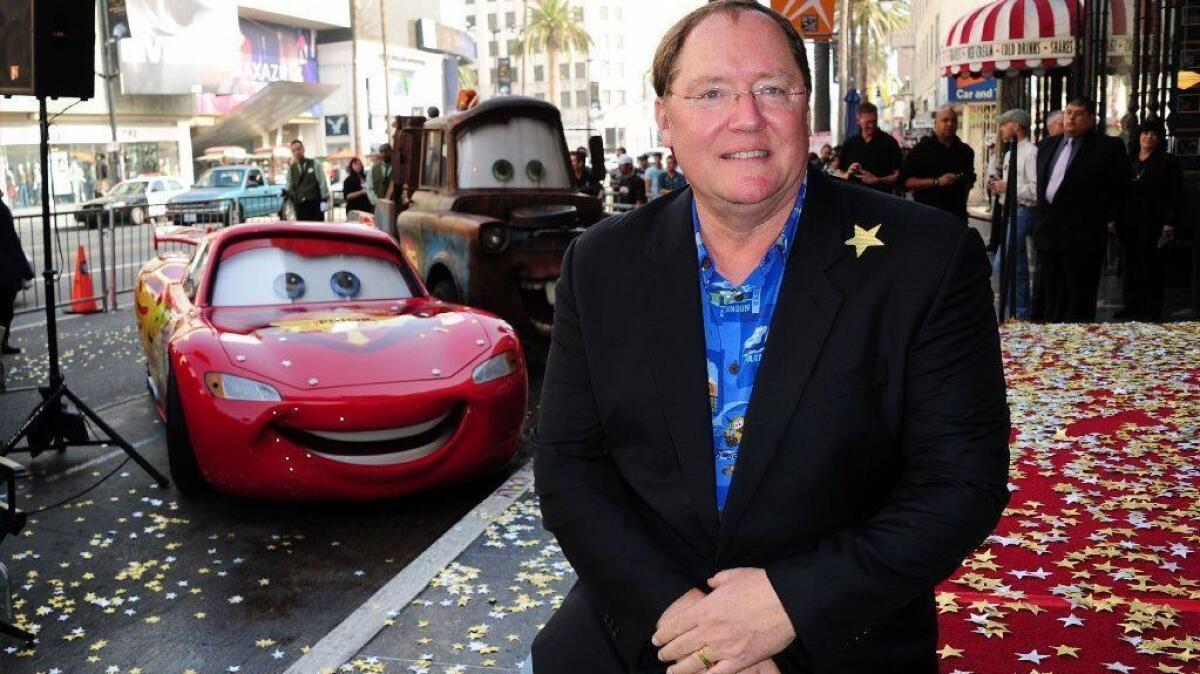Commentary: John Lasseter’s return proves that Hollywood still does not understand the damage he did

It is so reassuring to discover that David Ellison’s recent decision to hire former Pixar chief, Disney executive and billionaire frat house-atmosphere generator John Lasseter to head his company, Skydance Animation, was not one he made lightly.
We know this is so because Ellison said it, right in the middle of the memo he issued explaining his decision — Let me be clear: we have not entered into this decision lightly. As you can see, he said it in ital. So obviously he means it.
Even so, the protests began almost immediately, for obvious reasons: There are not enough “Toy Story” films in the world to outweigh the damage of behavior like that ascribed to Lasseter that’s been done to the film industry, or the culture at large.
Indeed, because Lasseter has been so influential and publicly beloved for so long, his self-described “missteps” are possibly more damaging than those of Harvey Weinstein. Weinstein may have remade the Oscar campaign, but Lasseter reinvented animation, and created the basis for new rides at Disneyland.
When the Weinstein scandal broke, Lasseter was, in fact, one of the names that often appeared in “who will be next” conversations. As David Ng reported in The Times last year, rumors of Lasseter’s inappropriate behavior had circulated for years, while the dearth of women in positions of creative authority at Pixar, with the few who were often leaving abruptly, was simply fact. Brenda Chapman, who in 2010 became the first female director hired at Pixar to make “Brave,” the first Pixar film with a female lead, was fired mid-production due to “creative differences” with Lasseter.
And #MeToo caught up with him fairly quickly; in November 2017 after Rashida Jones and her writing partner Will McCormack bailed on “Toy Story 4” and several female Pixar employees complained of being victim to his inappropriate touching and remarks, Lasseter “took” a six-month leave.
As Disney conducted its investigation, many other women came forward, some anonymously for fear of retribution in the still very male world of animation, with stories of surreptitious groping, overly intimate hugs, inappropriate comments and behavior that, if not describing a talented filmmaker who inarguably changed the nature of animation and made many people very rich, could easily be termed “lecherous.”
Lasseter’s pattern of behavior was so well known that according to more than a few employees, including two who spoke with The Times, certain young women were told point blank that they could not attend meetings with Lasseter because they would only distract him.
Which is, of course, the time-honored way of preventing sexual harassment in the workplace — keep women out of the workplace.
Last June, Disney announced that Lasseter would be leaving Disney and Pixar, with Disney president and CEO Bob Iger adding, among many superlatives, that the company was “profoundly grateful for his contributions.”
A few months later, Pixar hired its second female director, Domee Shi, who had made the celebrated short “Bao,” which was the first Pixar short directed by a woman.
In justifying his decision to hire Lasseter even as yet another study decried the lack of female directors, Ellison assures us that he is “certain that John has learned valuable lessons and is ready to prove his capabilities as a leader and a colleague. And he has given his assurance that he will comport himself in a wholly professional manner.”
Well, OK, then.
Never mind the absurdity of appointing as a no-doubt highly paid executive a man who must first promise to “COMPORT HIMSELF IN A WHOLLY PROFESSIONAL MANNER” (emphasis mine). But that, apparently, is the bar set by Skydance for its executives and they must really insist. Honestly, hands to yourself and no bottomless cocktails for you, mister, because what would Dory say?
It is difficult not to see Ellison’s decision as a cynical assumption that Hollywood is returning to “normal.” The once near-daily fall of men in power has decreased to merely occasional levels and serial sexual harasser Louis C.K. has been applauded at least in some circles for his stealthy return to comedy. With Lasseter’s return, Hollywood can finally get back to the business of celebrating all those geniuses who just happen to be male because so many of the women have left the room to avoid being groped and/or ejaculated in front of.
Yet everyone was shocked, shocked I say, to discover that, according to the latest USC Annenberg study, the percentage of female directors of major films declined in 2018, falling to a mere 3.6% from the already paltry 7.3% in 2017.
Sexual harassment, misconduct, or in Lasseter’s case “missteps” isn’t the only reason there are still so few women in the upper echelons of Hollywood, or politics, or corporate America, but it is absolutely one of them.
Whether using assault and rape as a tool for power and revenge, which Weinstein allegedly did, or creating a “frat house-like atmosphere” as Lasseter is accused of doing, sexual misconduct is a way of systematically controlling a workplace, and in Lasseter’s case, an industry. Of ensuring that a specific group of people, most usually women, are kept below decks in a status cage marked “sexual.”
The horrifying allegations that women were told not to go to meetings lest they distract these great men is what so many women feel keeps them from succeeding in the entertainment industry — they are literally barred from the conversations that would help them advance their careers because they are women and the people in positions of power are men.
Also, having to come up with defensive tactics, as Pixar employees say they were forced to do, can really take it out of you, cutting into the time and energy that might otherwise be spent on generating ideas, asking advice or generally doing actual work.
As for the men Lasseter led, well, what do they take from the fact that his behavior was an open secret that went on for years with no repercussions?
Maybe that this is a perk of the job? The spoils of war? That if women don’t want to be groped they should stop wearing skirts/smelling nice/being women?
Or maybe just that female members of the team are to be treated differently than male members, their physicality a bigger factor than their talent.
Whatever the answer, it’s not anything that resembles the leadership or vision that Ellison touts in his memo.
Every year we gape at the lack of women in positions of power in Hollywood and wonder why, despite all the studies and advocacy groups and mentorship programs, it does not appear to be improving.
Well, the fact that John Lasseter just got another job less than a year after being forced out of his old one is one very good, terribly bad, reason.
More to Read
The biggest entertainment stories
Get our big stories about Hollywood, film, television, music, arts, culture and more right in your inbox as soon as they publish.
You may occasionally receive promotional content from the Los Angeles Times.











